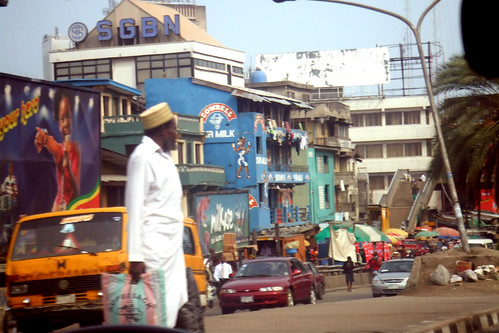Nigeria Match With S. Africa Is No Contest in the Bond Market
Nigeria #Nigeria

(Bloomberg) — As continental rivals Nigeria and South Africa compete in Africa’s most important football tournament on Wednesday, their fortunes are diverging in markets.
Most Read from Bloomberg
Nigeria’s dollar bonds have been among the world’s top performers in the past year, with a 25% return, as investors buy into major reforms in Africa’s biggest economy. By contrast, bonds from South Africa — the second-largest economy — have returned 4.4%, and foreign investor holdings have slumped to a record low in the face of its political and fiscal challenges.
That gap highlights how the competition in markets between the two African heavyweights, who face each other in the semifinal of the Africa Cup of Nations tournament for the first time in over two decades, has shifted in Nigeria’s favor. Nigeria’s Bola Tinubu has enacted a slew of economic changes since winning presidential elections nearly a year ago, while traditional powerhouse South Africa is struggling with budget deficits and corruption scandals.
“The market is buying into the idea that Nigeria has enough hard currency on its balance sheet,” said Gergely Urmossy, emerging markets strategist at Societe Generale SA in London. “Given the government’s reformist agenda, fundamentals are more likely to improve than worsen.”
Nigeria’s bond returns put it in the global top 10, still behind the likes of Tunisia, Pakistan and Argentina, though the average performance for its emerging market and frontier peers is only 5.8%, according to a Bloomberg index. Tinubu, who won elections held last February, plans to simplify the country’s tax laws and improve electricity supply this year, following moves to end costly fuel subsidies and relax the country’s complex exchange-rate regime.
The narrowing risk premium in the debt compared to South Africa shows good news is already priced in, said Sam Singh-Jami, Africa strategist at Rand Merchant Bank.
“The efforts made by authorities to see through the reforms they had embarked on have certainly enticed investors and provided support to the eurobonds,” she said. “We have also seen interest in Nigeria’s local market more recently.”
By contrast in South Africa, investors are worried about Finance Minister Enoch Godongwana’s budget later in February, given the government’s ever-widening financing needs. The consolidated budget deficit should widen to 4.8% of gross domestic product this year in a major overshoot of official estimates, Fitch Ratings predicts.
South African Rand Risks Familiar February Pain as Budget Looms
On top of that, the nation will hold general elections this year, following a slew of corruption cases plus crises at state energy company Eskom Holdings SOC Ltd. and state-run rail and ports operator Transnet SOC.
On the football pitch, Nigeria also has better form. Its “Super Eagles” team has won the previous three Africa Cup of Nations encounters with South Africa by an aggregate score of 8-1. And it has won the last four games without conceding a goal. Tournament host Ivory Coast will contest the other semi-final against the Democratic Republic of Congo.
“I think being the underdog suits us, keeps us humble and puts all the pressure on Nigeria,” said Michael Treherne, a Johannesburg-based portfolio manager at Vestact, already wearing his gold and green ‘Bafana Bafana’ shirt to be ready for the evening game.
(Updates with quote from RMB in second paragraph after chart.)
Most Read from Bloomberg Businessweek
©2024 Bloomberg L.P.